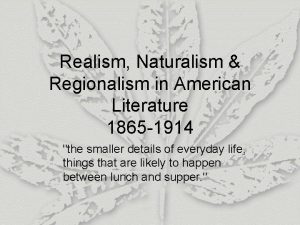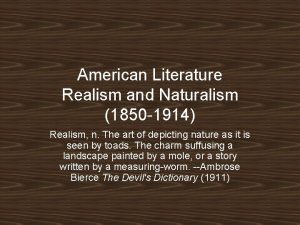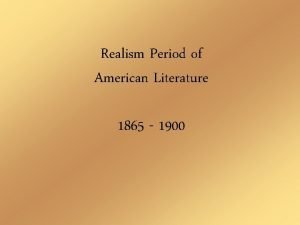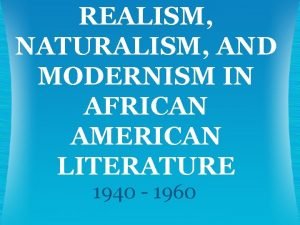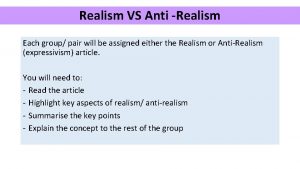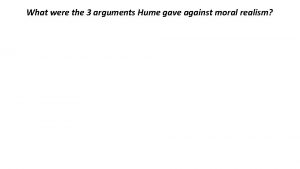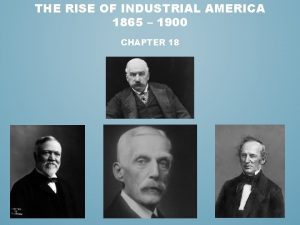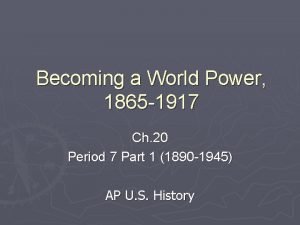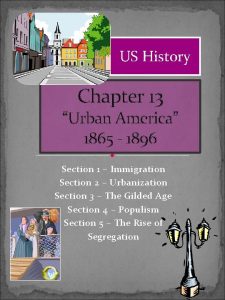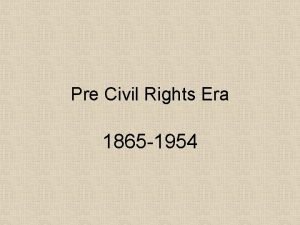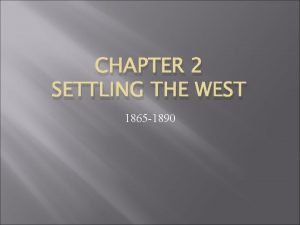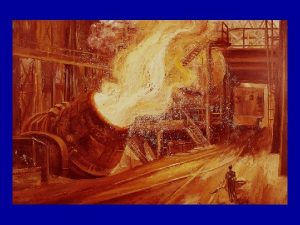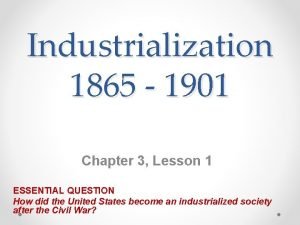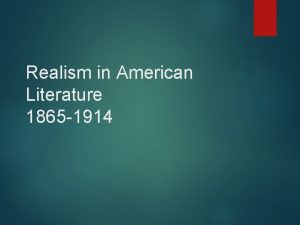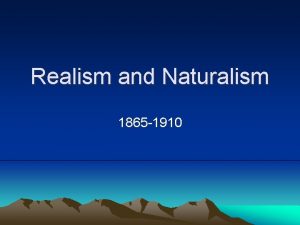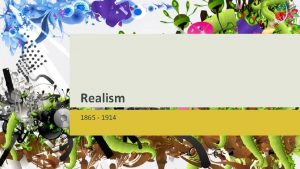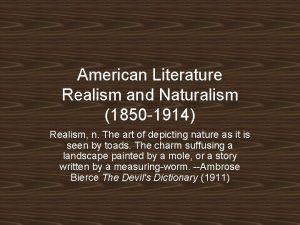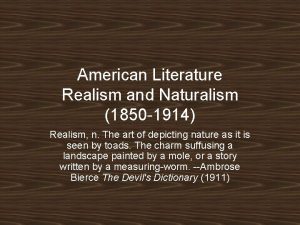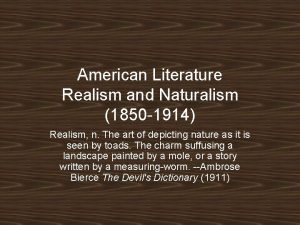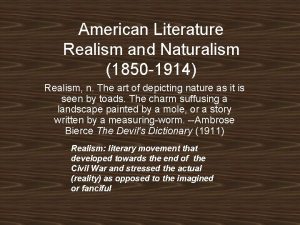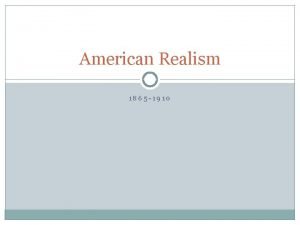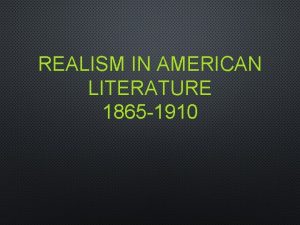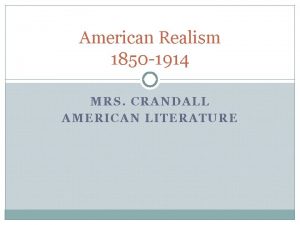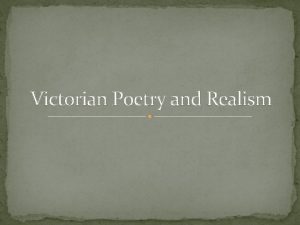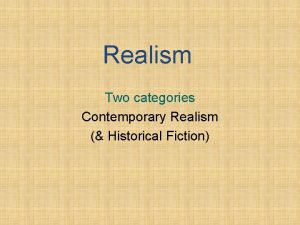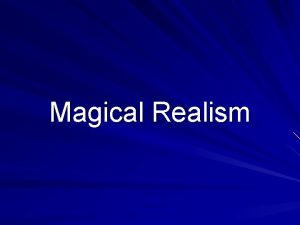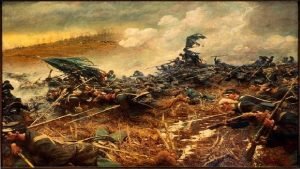Realism in American Literature 1865 1914 American Literature






















- Slides: 22

Realism in American Literature 1865 -1914

American Literature The Puritan Era 1600 - 1750 Age of Reason 1750 -1800 Realism Romanticism Transcendentalism 1800 -1840 -1855 1865 -1915 Contemporary and Post-Modern Period Modernism 1916 -1946 – Present

Historical Context The Civil War � A nation divided � Interrupts Transcendentalism

� Population of the United States is growing rapidly. (1865 -1915) � Science, industry and transportation are expanding. � Literature also was growing, but most new writers were not Romantics or Transcendentalists. They were Realists. � The “Frontier” did not exist as before; its legacy changed and impacted Realists in its new form. � The aftermath of the Civil War meant that Americans were less certain and optimistic about the future. � The idealism of the Romantics and philosophy of Transcendentalists seemed out of date and irrelevant to many readers.

Intellectual Revolution: Changes in thinking brought about by changes in society �Changes in science �Changes in psychology �Changes in philosophy

Science: Charles Darwin • Published The Origin of Species, – Hypothesized that man is the product of evolution, – Man is special not because God created him in His image, • but because man had successfully adapted to changing environmental conditions • and had passed on his survival-making characteristics to his progeny.

Psychology: Sigmund Freud � Believed that the mind could be understood in terms of repressed urges, usually sexual; � Theorized an unconscious system of ideas that governs human reactions and response; � Id, Ego, and Super-ego

Philosophy: Karl Marx � Explained human history as the result of class struggles; � Human identity is defined by social context; � It is human nature to transform nature.

From these social changes come two literary movements Realism, first begun as the local color movement Naturalism

“Literature of Discontent” �Along the lines of Naturalism, the social problems of this period were seen as a force to deal with. �Many groups, from women to freed slaves, started expressing their discontent with the way things were. �They started addressing these issues in their writing.

Realism Begins in France, as realisme, a literary doctrine calling for “reality and truth in the depiction of ordinary life. ” Grounded in the belief that there is an objective reality which can be portrayed with truth and accuracy as the goal; The writer does not select facts in accord with preconceived ideals, but rather sets down observations impartially and objectively.

I. The Age of Realism (1865 -1910) � 2. The Definition of Literary Realism � A. As a literary movement, realism came in the latter half of the 19 th century as a reaction against “the lie” of Romanticism and sentimentalism. � B. It expressed the concern for the world of experience, of the commonplace, and for the familiar and the low. � William Dean Howells: he[the writer] must write what he observed and knew � Henry James: Life should be the main object of the novel. � Mark Twain: writers should keep in their mind the soul, the life, and the speech of the people. � C. In matters of style, there was contrast between the genteel and graceful prose on the one hand, and the vernacular diction, rough and ready frontier humor on the other. � D. The American authors lumped together as “realists” seem to have some features in common: � a. “verisimilitude of detail derived from observation” � b. an objective rather than an idealized view of nature and experience � E. William Dean Howells, Henry James and Mark Twain as the representatives

A Reaction against Romanticism • These authors sought to portray life as they saw it, insisting that the ordinary and local were just as suitable for art as the sublime. “Nothing more and nothing less than the truthful treatment of material. “ William Dean Howells

Romance and Realism: Taste and Class Romance Aspired to the ideal Thought to be more genteel since it did not show the vulgar details of life Realism Thought to be more democratic Critics stressed the potential for vulgarity and its emphasis on the commonplace

According to William Harmon and Hugh Holman, "Where romanticists transcend the immediate to find the ideal, and naturalists plumb the actual or superficial to find the scientific laws that control its actions, realists center their attention to a remarkable degree on the immediate, the here and now, the specific action, and the verifiable consequence" (A Handbook to Literature 428).

Characteristics of Realism The purpose of the writing is “to instruct and entertain” Character is more important than plot. Subject matter is drawn from real life experience. The realists reject symbolism and romanticizing of subjects. Settings are usually those familiar to the author. Plots emphasized “the norm of daily experience” Ordinary characters

Subject matter—ordinary people and events; Purpose—Verisimilitude, the truthful representation of life; Point of View—omniscient and objective Characters—middle class, psychological realism Plot de-emphasized Focus on everyday life Complex ethical choices often the subject Events are made to seem the inevitable result of characters’ choices

Characters � Characters are more important than action or plot Have an important ethical decision to make � Characters appear in real complexity of temperament and motive Relation to nature, to each other, to their social class, and to their own past � Class is important Usually middle class or poor � Characters spoke in regional dialect and/or diction

Other Characteristics � Relations between people and society are explored � Language is not heightened or poetic � No allegory or symbolism everything is clearly communicated � Tone may be comic, satiric or matter-of-fact

Themes in Realism Humans control their destinies characters act on their environment rather than simply reacting to it. Slice-of-life technique often ends without traditional formal closure, leaving much untold to suggest man’s limited ability to make sense of his life.

Some Writers from Realism Stephen Crane The Red Badge of Courage Willa Cather O Pioneers! My Antonia Bret Harte “Outcasts of Poker Flats” Jack London The Call of the Wild Kate Chopin! Story of an Hour Mark Twain Life on the Mississippi The Adventures of Tom Sawyer The Adventures of Huckleberry Finn

The Ultimate Problem in Realism �Whose reality is portrayed? Those in power, usually male, white and privileged �Whose reality is marginalized and ignored? Those without power: women, people of color, people of lower economic means
 American literature 1865 to 1914
American literature 1865 to 1914 Romanticism vs realism vs naturalism
Romanticism vs realism vs naturalism Realism in american literature
Realism in american literature Realism literature characteristics
Realism literature characteristics Realism and naturalism in literature
Realism and naturalism in literature Realism naturalism modernism in african american literature
Realism naturalism modernism in african american literature Realism vs anti realism
Realism vs anti realism No moral
No moral Briefly recap
Briefly recap 1865 to 1900 inventions
1865 to 1900 inventions Traits of impressionism
Traits of impressionism Where did the term “impressionism” come from?
Where did the term “impressionism” come from? The rise of industrial america 1865-1900
The rise of industrial america 1865-1900 Chapter 20 becoming a world power notes
Chapter 20 becoming a world power notes Urban america 1865 to 1896
Urban america 1865 to 1896 1877-1865
1877-1865 1954-1865
1954-1865 Guided reading activity settling the west 1865-1890 answers
Guided reading activity settling the west 1865-1890 answers Hollywood silver fox farm v emmett
Hollywood silver fox farm v emmett Industrialization (1865 to 1901 worksheet answers key)
Industrialization (1865 to 1901 worksheet answers key) Becoming a world power 1865-1917
Becoming a world power 1865-1917 Chapter 3 lesson 1 the rise of industry answers
Chapter 3 lesson 1 the rise of industry answers Gregor mendel 1865
Gregor mendel 1865
